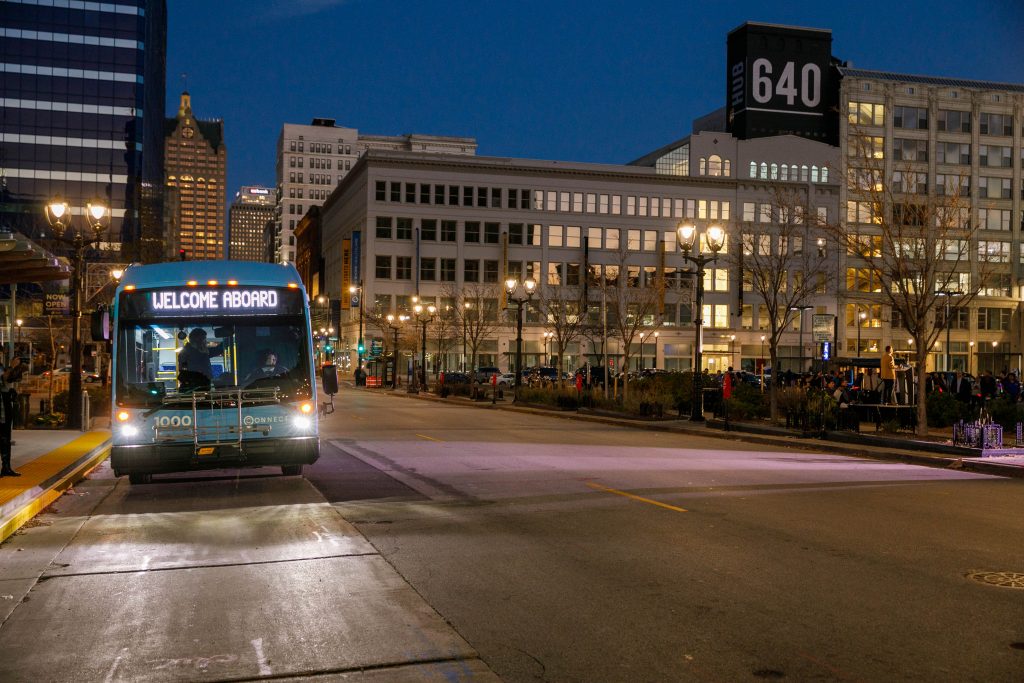Is It the End of Battery Electric Buses for Milwaukee?
Top transit officials say there are currently no reliable manufacturers in U.S. market.

MCTS Battery Electric Bus. Photo Courtesy of MCTS.
Milwaukee County’s top transportation officials recently said there are no battery electric bus (BEB) manufacturers the county can do business with in the near term.
The Milwaukee County Transit System (MCTS) began operating its first BEBs along the new bus rapid transit service, Connect 1, in June. Those buses were made by the Canadian manufacturer Nova Bus. Earlier this year, Nova Bus exited the U.S. market. And the county has already had to replace the batteries due to a manufacturing issue.
Officials say the manufacturers that remain in the market are either having trouble with their technology or would be unable to fulfill an order any time in the next few years.
Sup. Ryan Clancy drafted an amendment to the 2024 county budget that would have delayed purchase of 30 new clean-diesel buses until transit officials furnished the board with a report on replacing diesel buses with electric buses.
But the transit system has more than a hundred buses aging out of their useful lifespan, and it’s unlikely the county would be able to replace significant numbers of buses with BEBs during the next few years, if they can replace any at all.
“Your problem is, there’s not anyone right now to give us the delivery of buses at this time,” said Donna Brown-Martin, director of the Milwaukee County Department of Transportation, during a budget amendment meeting on Friday. The board’s budget committee rejected the amendment.
Chinese manufacturer BYD has issued recalls in the past for its batteries. “They nationally have failed to be able to provide electric batteries for their buses,” said Brown-Martin. Another manufacturer, California-based Proterra, filed for bankruptcy this past summer. New Flyer, another Canadian manufacturer, has had safety issues with its batteries and issued a recall in 2023.
MCTS has been purchasing diesel buses from Gillig, but MCTS Managing Director Denise Wandke said it would take the California-based manufacturer at least two years before the company could begin to process the county’s order. “So there are no manufacturers that we would currently be able to work with to provide those buses,” Wandke said.
“Recent developments within the American bus manufacturing market have led to a dramatic decline in total bus manufacturers,” MCTS said in a statement to Urban Milwaukee. “However, we have solid relationships with those still actively manufacturing buses here and we continue to research all bus products in the market.”
The county purchased 15 BEBs from Nova Bus, a subsidiary of Volvo Group, with plans to operate on the Connect 1 and use the other four for a pilot program running BEBs on other routes. The county is still waiting for three more buses to be delivered, Brown-Martin said. BEBs cost, on average, two to three times as much as a diesel bus. The model the county has can run 247 miles on a single charge, but a charger is included at the western end of the Connect 1 route.
The Connect 1 launched in June and less than a month into service, the transit system was replacing a battery. By the end of August, MCTS pulled the BEBs from the road. The transit system said the buses were pulled “out of an abundance of caution” and to have the batteries replaced by the manufacturer. They have gradually been reintroduced to service.
When the county policymakers first moved the transit system in the direction of BEBs in 2019, Brown-Martin expressed concern about the technology to supervisors, saying she was “not a big proponent” of electric buses.
The county has plans to develop two more bus rapid transit routes in the coming years. But, unless officials find a manufacturer that can reliably meet the county’s needs, it appears unlikely they will be planned with BEBs running along them.
“Future procurements of BEBs will require new specification development and competitive solicitation through an RFP,” MCTS said. “There is currently no active search for a manufacturer. However, MCTS is committed to achieving the County’s climate equity goals and is researching future options for the types of buses to procure.”
Electric buses are perceived as desirable both for their reduced emissions, including the ability to be powered by renewable energy, and for providing riders with a quieter ride.
If you think stories like this are important, become a member of Urban Milwaukee and help support real, independent journalism. Plus you get some cool added benefits.
MKE County
-
Key Questions in Dugan Trial Take Shape on First Day
 Dec 15th, 2025 by Graham Kilmer
Dec 15th, 2025 by Graham Kilmer
-
FTA Tells Milwaukee to Crack Down on Fare Evasion — Even Where Fares Don’t Exist
 Dec 12th, 2025 by Graham Kilmer
Dec 12th, 2025 by Graham Kilmer
-
Legal Filing Describes ‘Horrid Living Conditions’ at County Jail
 Dec 11th, 2025 by Graham Kilmer
Dec 11th, 2025 by Graham Kilmer
Transportation
-
Congestion Pricing Cuts Air Pollution in New York City
 Dec 14th, 2025 by Jeff Wood
Dec 14th, 2025 by Jeff Wood
-
FTA Tells Milwaukee to Crack Down on Fare Evasion — Even Where Fares Don’t Exist
 Dec 12th, 2025 by Graham Kilmer
Dec 12th, 2025 by Graham Kilmer
-
Will GOGO’s Bus Service Ever Get Going?
 Dec 9th, 2025 by Jeramey Jannene
Dec 9th, 2025 by Jeramey Jannene






















Having “electric” buses is awesome and we should obviously keep evolving our transit system to move away from fossil fuels. But the issue here is that these are BATTERY electric buses. These are far more expensive. Trolleybuses, an electric bus that draws power from overhead wires using spring-loaded trolley poles, are a much better idea. They have been reliable and efficient transit all over the world for many decades.
@Goya there’s way more infrastructure (read: cost) involved with both building and then maintaining such a setup.
Vs with a BEB you just plop on the ground and it’s ready to go, plug in to charge later, etc.
It works better in a tight grid where lots of routes can share the same network of overhead wires, but this is just a single long line all by itself.
MCTS buying these BEBs was driven by political considerations, not engineering considerations. As I wrote in an earlier post, a financially challenged transit system should not be “debugging” new technology – something best left to better financed systems (which regretfully would be mostly outside the US),
On top of the hassle of debugging a new technology, now MCTS is now stuck with “orphaned” models. Regardless of what the manufacturer says about ongoing support, standing behind their products, etc., this is unlikely to go well. The BEBs will require special maintenance skills that are only needed for this small fleet, resources that will be taken from maintaining the main part of the MCTS fleet. Availability and/or quality of replacement parts will become problematic.
I mean no disrespect for MCTS management. They have to follow the directives they get from multiple levels of government, most of which were dazzled with this emerging technology and unable to see the risks of being early adopters.